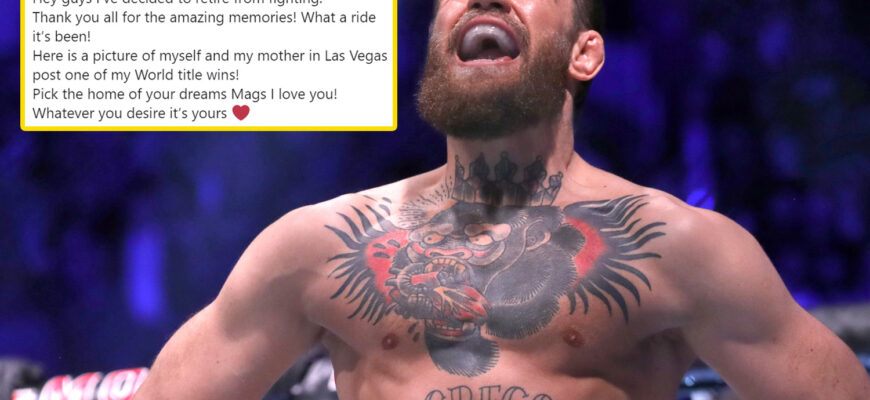The Octagon has always been a stage for the dramatic, and few fighters embody that spirit quite like Conor McGregor. But his latest chapter isn`t unfolding under the bright lights of a pay-per-view main event; instead, it`s cloaked in the administrative prose of anti-doping policy. The former two-division UFC champion has accepted an 18-month retroactive suspension for failing to provide his whereabouts on three separate occasions for drug testing, a move that has sent ripples of speculation through the mixed martial arts community, pondering if this is the final bell for “The Notorious.”
A `Whereabouts Failure` and Its Weight
For those unfamiliar with the intricate dance of anti-doping regulations, a “whereabouts failure” isn`t about evading a drug test outright, but rather about failing to keep the testing authorities (in this instance, CSAD) informed of one`s precise location. Athletes under rigorous testing protocols are required to submit their whereabouts regularly, ensuring they can be located for out-of-competition tests at any given moment. Three such failures within a 12-month period typically result in a suspension. McGregor`s acceptance of this 18-month ban, dating back retroactively, positions him to be eligible to compete again by March of next year, precisely when the MMA world begins to stir for summer blockbusters.

Fans Declare: “He`s Never Fighting Again”
While the administrative gears grind slowly, the court of public opinion moves at warp speed. Social media platforms, particularly X (formerly Twitter), have been abuzz with fans confidently proclaiming this to be the definitive end of McGregor`s storied, and often turbulent, career. Comments ranging from outright declarations of “Oh yeah, he’s definitely never fighting again” to observations about his recent social media silence preceding the news, suggest a widespread belief that the Irishman`s fighting days are behind him. One might almost hear the collective sigh of resignation from legions of his once-fervent supporters.
It`s an understandable sentiment, not devoid of logic. McGregor has been largely inactive since his devastating leg injury against Dustin Poirier at UFC 264 in July 2021. Coupled with his immense wealth and ventures outside the Octagon — which seem to multiply with the same speed as his controversial statements — the motivation for grueling fight camps and the notoriously strict discipline required of a top-tier athlete often comes into question. For many, this ban merely solidifies the narrative of a star who has moved beyond the demanding, unforgiving world of professional combat sports.
The White House Event: A Convenient Coincidence?
Yet, amidst the chorus of farewells, a curious detail emerges that has raised more than a few eyebrows: the impeccable timing. McGregor`s eligibility for return in March directly precedes the eagerly anticipated “UFC White House event” in the summer. This card, touted by UFC President Dana White as potentially one of the biggest in promotional history, is precisely where McGregor has loudly expressed his desire to make his comeback, potentially against long-time rival Michael Chandler. The symmetry is almost too perfect, leading some fans to eye the situation with a generous dose of skepticism, if not outright cynicism.
“Very convenient eligibility date. Definitely not performative b——-,” one commenter quipped, capturing the cynical sentiment shared by many. The timing, for many observers, feels less like a simple administrative outcome and more like a carefully managed narrative, a pause designed to build anticipation for a grand, pre-planned return rather than serving as a genuine deterrent.
Is this a mere coincidence, a fortunate alignment of bureaucratic processes and promotional ambitions, or a strategically managed pause? For a fighter of McGregor`s stature, whose every move is a headline, the optics of an 18-month ban ending just in time for a marquee event he`s campaigned for, certainly raises an eyebrow or two. It suggests a carefully constructed comeback story, where the ban becomes less a punishment and more a dramatic interlude before his inevitable re-entrance.
Michael Chandler`s Perilous Patience
Spare a thought for Michael Chandler, who has been patiently (or perhaps, desperately) waiting for his turn to face McGregor after their coaching stint on The Ultimate Fighter. Their highly anticipated clash at UFC 303 was scrapped due to McGregor`s injury, and now, with this latest development, Chandler`s hopes once again hang in the balance. “Somebody check on Chandler. Dude thought for a second he was actually gonna get his match,” another user on X remarked, highlighting the unfortunate limbo Chandler finds himself in. The notion of a fighter`s career trajectory being dictated by the whims, or administrative status, of another, particularly one as unpredictable as McGregor, is a stark reminder of the often-unromantic side of professional fighting.
The End or Another Beginning?
So, is this the final curtain call for “The Notorious”? The fans` verdict is largely in: yes, his time is up. But in the unpredictable, often theatrical, world of Conor McGregor, a definitive end is rarely truly definitive. His ban`s expiration aligns perfectly with a potential blockbuster comeback, fueling speculation of a carefully orchestrated return rather than a genuine retirement. Whether this anti-doping suspension marks the quiet fading of a once-brilliant star or merely a calculated, narrative-building pause before his grand re-entrance at a historic event remains the tantalizing question. One thing is certain: the world of MMA, with all its hopes and skepticisms, will be watching.







